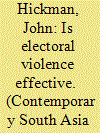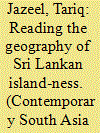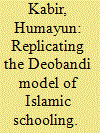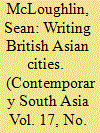| Srl | Item |
| 1 |
ID:
092248


|
|
|
|
|
| Publication |
2009.
|
| Summary/Abstract |
This research note reports empirical findings from a study of the effectiveness of electoral violence and intimidation in Sri Lanka's 2005 presidential election. Using the previous 1999 presidential election as a baseline for comparison, analysis conducted at the polling division level reveals that both United National Party (UNP) candidate Ranil Wickramasinghe and United People's Freedom Alliance (UPFP) candidate Mahinda Rajapakse experienced declines in the percentage of votes in polling divisions where opponent party activists committed acts of violence or intimidation. Fewer polling divisions reported violence or intimidation by UNP than UPFP activists, but the former appear to have been more effective in demobilizing voters.
|
|
|
|
|
|
|
|
|
|
|
|
|
|
|
|
| 2 |
ID:
092246


|
|
|
|
|
| Publication |
2009.
|
| Summary/Abstract |
This article focuses on the cultural dimensions of Sri Lanka's island geography. In particular it argues the importance of regarding the geography of Sri Lankan island-ness as a representational and imaginative trope repetitively and textually inscribed over time. I trace the contours of a topological enclosure that seem so matter-of-fact, natural and characteristic of the Sri Lankan island-state. Inviolability and historical-territorial integrity have become eponymous with the very sign 'Sri Lanka', but these ways of imagining and mapping Sri Lankan island space have European, colonial and post-independent spatial histories that are textual and representational. In reading a range of disparate texts that inscribe and map these insular geographies, the essay argues the importance of placing Sri Lanka's island geographies, and its civil war that had the contested island imagination at its core, in a critical postcolonial and spatial historical context. By tracing and loosening some of the misplaced concreteness surrounding settled geographical imaginations and understandings of a Sri Lankan island-state, the essay intervenes in that spatial discourse thereby gesturing toward the political possibilities of thinking and imagining island space differently.
|
|
|
|
|
|
|
|
|
|
|
|
|
|
|
|
| 3 |
ID:
092245


|
|
|
|
|
| Publication |
2009.
|
| Summary/Abstract |
Market-based reforms implemented in the agricultural input management system are often claimed to be one of the success stories in Bangladesh. Based on the findings of 154 surveys and 16 in-depth interviews with the stakeholders during 2003-2004, the paper found that although there have been some notable achievements, the reforms have not achieved their expected outcomes and more importantly, in cases where they have been achieved, their sustainability is in question. The paper discusses the underlying reasons for the success and the problems of the reforms and also offers some policy recommendations to resolve the gap between the expected and the achieved outcomes. In the context of increasing donor pressure for adopting market-based reforms, the findings are likely to have important implications for both the donors and other countries in South Asia.
|
|
|
|
|
|
|
|
|
|
|
|
|
|
|
|
| 4 |
ID:
092247


|
|
|
|
|
| Publication |
2009.
|
| Summary/Abstract |
The proliferation of the Deobandi model of religious school has been taken for granted in South Asia, although how its pedagogic method and theological stances are being replicated in Bangladesh has received little academic attention. This paper delves into the replication of the Deobandi model of religious schooling in Bangladesh by describing the replication process in a local Quomi madrasa, which received strong patronage from Deoband at the height of the Islamic revivalist-reformist movements in South Asia. This study reveals that localized versions of Deobandi madrasas in Bangladesh are concerned with the 'other' Muslims, that is, Muslims with doctrinal views differing from the Deobandi school of thought. The contestation between the Deobandi interpretation of Islam and the other interpretive Islamic groups within the circle of madrasas suggests that Muslim identity is a matter of contention, with differing points of view from one type of madrasa to another and from one group of ulama to another.
|
|
|
|
|
|
|
|
|
|
|
|
|
|
|
|
| 5 |
ID:
092244


|
|
|
|
|
| Publication |
2009.
|
| Summary/Abstract |
After an extended period of indifferent economic growth, the Indian economy has been one of the fastest growing economies of the world since the 1980s. Both the timing of India's growth acceleration and the causes of India's economic growth remain contested. The paper argues that India's growth turnaround occurred in the late 1970s, and not in the 1980s or 1990s as commonly understood. Furthermore, most interpretations of India's growth acceleration have tended to privilege one dimension of the growth experience over another, and that an analysis of the causes of India's growth suggest a more complex story and that no single perspective can provide a convincing explanation of India's growth phenomenon.
|
|
|
|
|
|
|
|
|
|
|
|
|
|
|
|
| 6 |
ID:
092249


|
|
|
|
|
| Publication |
2009.
|
| Summary/Abstract |
This article reports in brief on an Arts and Humanities Research Council (AHRC) Diasporas, Migrations and Identities (DMI) programme funded network, 'Writing British-Asian Cities', which ran between 2006 and 2009. It contends that the diverse local configuration of Asian Britain has to a large extent remained unexamined in the literature. Having organised community-based events in five English cities, an indication is given of how London's East End, Bradford, Manchester, Birmingham and Leicester have all been 'written' and represented across a variety of genres since the 1960s. Bringing the perspectives of the social sciences into conversation with the arts and humanities, the network also prioritised further reflection on certain disciplinary perspectives and cross-cutting themes: history; literary/cultural production; religion; gender. Various working papers and other resources which report in more detail on the project are lodged on an interactive website, while a research group of the British Association of South Asian Studies (BASAS) has also been recently established.
|
|
|
|
|
|
|
|
|
|
|
|
|
|
|
|